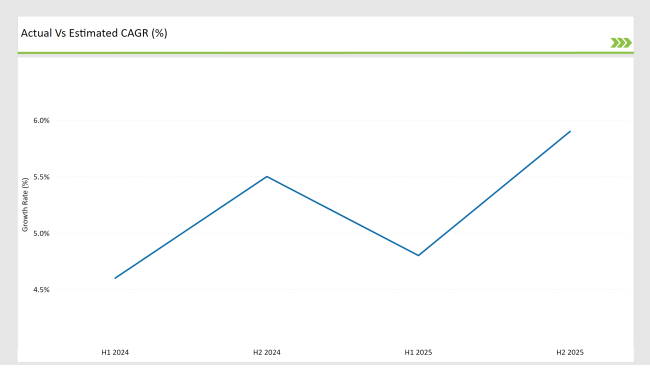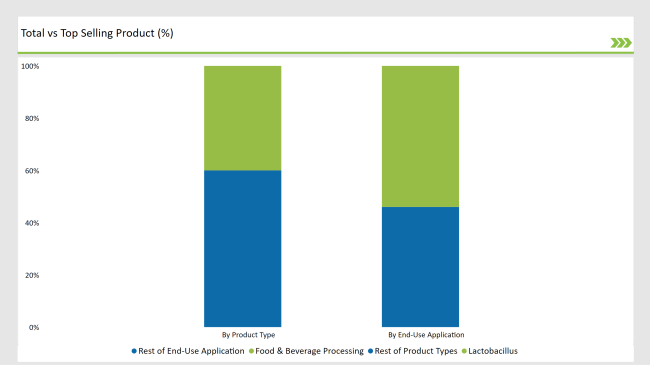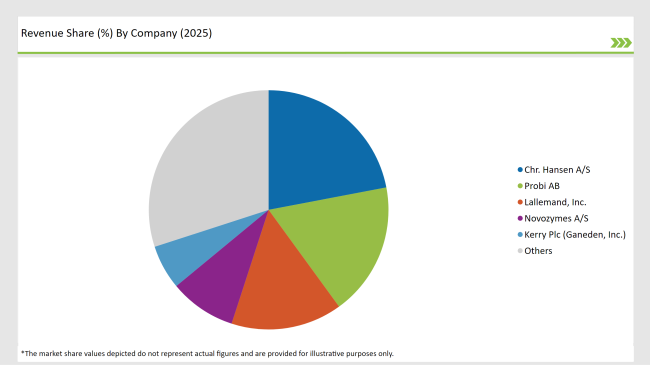The USA Probiotic Strains Market is projected to reach USD 661.0 million in 2025, growing at a CAGR of 5.8% over the next decade to an estimated value of USD 1,161.6 million by 2035.
| Attributes | Description |
|---|---|
| Estimated USA Probiotic Strains Industry Size (2025E) | USD 661.0 million |
| Projected USA Probiotic Strains Industry Value (2035F) | USD 1,161.6 million |
| Value-based CAGR (2025 to 2035) | 5.8% |
The demand for premium probiotic bacteria is increasing not only because of the public awareness of human gut health, immune system health, and general health but also due to several sectors such as food residing, beverages, dietary supplements, and personal care products.
Numerous crucial factors play a role in driving this growth the increasing prevalence of digestive ailments, people's tendency to flavor preventive healthcare, and the expanding popularity of functional foods.
The advancement of the industry appears to be guaranteed (or at least it seems so) because of scientific breakthroughs in probiotic strains, the new approvals for indications regarding probiotics, and the improved delivery systems for these modified and enhanced probiotics. However, challenges remain, but the momentum is undeniable. Although the path ahead may be complex, this progress is indicative of a broader shift in health consciousness.
However, challenges remain. Although the potential is significant, some complexities must be addressed. Companies are making investments in microencapsulation methods, new formulation techniques, and personalized probiotics to increase efficacy and shelf life.
Despite such positive statements, market challenges persist such as the rigorous requirement from the FDA, concerns about the viability of probiotic strains, and competition with prebiotic formulations. Solving these barriers through clinical trials, measures related to quality assurance, and probiotic strain individualization are the strategies that the companies are focusing on.
The USA Probiotic Strains Market is experiencing consistent growth, driven by increasing consumer demand for gut-friendly products and clinically-supported probiotic formulations. Improvements in precision probiotics and unique health advantages of specific strains are influencing product innovation and regulatory clearances.

H1 signifies period from January to June, H2 Signifies period from July to December
| Date | Development/M&A Activity & Details |
|---|---|
| January 2024 | Chr. Hansen A/S: Introduced a novel Lactobacillus strain targeting immune system modulation and gut flora balance. |
| March 2024 | Probi AB: Expanded its Bifidobacterium-based probiotic range, enhancing clinical support for digestive disorders. |
| May 2024 | Lallemand, Inc.: Partnered with nutraceutical brands to develop heat-stable probiotic supplements. |
| July 2024 | Novozymes A/S: Launched microencapsulated probiotic strains, improving shelf stability and bioavailability. |
| September 2024 | Kerry Plc (Ganeden, Inc.): Secured FDA approval for a novel Bacillus strain, enhancing gut and skin health applications. |
Increasing Demand for Probiotic-Enriched Functional Foods
The yogurt and beverage sector leads a significant growth in the probiotic strain applications with manufacturers adding probiotic cultures into dairy, fermented foods, beverages, and snack products. The shift towards gut-health-enhancing yogurt, kombucha, and plant-based probiotic drinks is propagating the market’s reach.
Consumers are not only looking for non-dairy probiotic formulations such as almond-based, oat-based, and coconut-based probiotic drinks but are also aligning themselves with the notion of vegan and lactose-free diets. Food processors are further investigating heat-resistant probiotic strains to add to the stability of baked goods and ready-to-eat meals.
Scientific Innovations and Personalized Probiotics
The advances in methods of genomic and sequence finding and application of the algorithm for probiotic research are leading to the realization of personalized probiotic solutions suitable to individual gut microbiomes. The firms are concentrating on strain-specific formulations, which affect immune support, mental well-being, and metabolic health.
Investment in clinical trials, research on gut-brain axis interactions, and probiotic strain stability is boosting industry confidence. The integration of prebiotics and synbiotics is further optimizing probiotic efficacy, paving the way for next-generation functional supplements and cosmeceuticals.
% share of Individual categories by Product Type and End-Use Application in 2025

Health benefits of Lactobacillus species have been extensively documented and it is for this reason that they are at the forefront of the USA probiotic strains market with a 40% market share. The most common reason for the popularity of these strains is the provision of a healthy gut, as they aid in digestive health and are known to boost the immune system.
In addition to the fermentation of dairy products, functional beverages, and dietary supplements, Lactobacillus is also found in various applications indicating that it is a flexible option for consumers who want to control their health.
People are becoming more aware of the advantages of probiotics and are thus driving demand for Lactobacillus formulations. With the constant change of the flora and the increase in the number of strains used, the Lactobacillus strains are foreseen to dominate and thereby strengthen their position as the backbone of the probiotic market.
The USA probiotic strains market is led by the food and beverage processing sector, contributing to a 50% share due to the increase in the fortification of probiotics in different products.
The demand for probiotic-fortified drinks and dairy alternatives with gut-health benefits is the main factor influencing this trend. Nowadays, as consumers opt for healthier choices, manufacturers are more and more frequently adding probiotics to their product mixes to meet the desire of customers for foods that help maintain the health of the digestive system.
This segment comprises a variety of products like yogurt, smoothies, and drinks from plants that have been fortified with probiotics. The growing interest in personal health and wellness continues to drive the changes in the market which means the food and beverage sector will have to be creative, develop new products, and use probiotics to improve nutritional value in the process.

Note: above chart is indicative in nature
It is important to note that besides the external trend highlights of the probiotic strains market in the USA, it is also a unique structure with a particular level of competition in which major firms and specialized units are the main innovative and growth factors.
The biggest share of the market is held by Tier 1 Companies, where Chr. Hansen A/S, Probi AB, Lallemand, Inc., and Novozymes A/S are the forerunners. These companies are at the forefront of investment in research and development while at the same time, their probiotic strains get the support of regulatory approvals. The wide distribution SW of their company makes it possible to address a wide range of consumers thus strengthening their positions as market leaders.
Tier 2 Companies like Ganeden, Inc. (Kerry Plc), Archer Daniels Midland, and Sabinsa Corporation dedicate their resources to the innovation of heat-stable and shelf-stable probiotic products. These companies not only meet the rising demand for dietary supplements but they also add value to the cosmeceuticals' products by providing prebiotics that are effective, easy to use, and safe for consumers.
Tier 3 Companies, which comprise Alltech and Merck Group are the ones that ferment probiotic strains and provide exploratory trials. They mainly offer tailored probiotic formulas, which helps them capture specific target markets and satisfy solely defined requirements of the consumers. This variety in the market structure leads to innovation and flexibility, which, in turn, makes the probiotic strains market in the USA lively.
The USA Probiotic Strains Market is segmented by product type into Lactobacillus species, Bifidobacterium species, Bacillus species, and others.
By end-use application, the market is categorized into food & beverage processing, dietary supplements, personal care & cosmetics, and others
The market is projected to reach USD 1,161.6 million.
The market is expected to grow at 5.8% CAGR.
Lactobacillus species dominate with a 40% market share.
Rising demand for functional foods, scientific advancements in probiotic research, and increasing gut-health awareness.
Chr. Hansen A/S, Probi AB, Lallemand, Novozymes, and Kerry Plc (Ganeden, Inc.).






Full Research Suite comprises of:
Market outlook & trends analysis
Interviews & case studies
Strategic recommendations
Vendor profiles & capabilities analysis
5-year forecasts
8 regions and 60+ country-level data splits
Market segment data splits
12 months of continuous data updates
DELIVERED AS:
PDF EXCEL ONLINE
USA Medical Coding Market Size and Share Forecast Outlook 2025 to 2035
USA Labels Market Size and Share Forecast Outlook 2025 to 2035
USA Plant-based Creamers Market Size and Share Forecast Outlook 2025 to 2035
USA Barrier Coated Paper Market Size and Share Forecast Outlook 2025 to 2035
USA Electronic Health Records (EHR) Market Size and Share Forecast Outlook 2025 to 2035
USA Animal Model Market Size and Share Forecast Outlook 2025 to 2035
USA and Canada Packer Bottle Market Size and Share Forecast Outlook 2025 to 2035
USA Stretch Hood Films Market Size and Share Forecast Outlook 2025 to 2035
USA and Canada Fence Screen Market Size and Share Forecast Outlook 2025 to 2035
USA Lubricant Contaminated HDPE Container Waste Market Size and Share Forecast Outlook 2025 to 2035
USA Commercial Walk-In Refrigeration Market Size and Share Forecast Outlook 2025 to 2035
USA & Canada Pre-painted Steel Roofing and Cladding Market Size and Share Forecast Outlook 2025 to 2035
USA Residential Cotton Candy Maker Market Size and Share Forecast Outlook 2025 to 2035
USA Faith Based Tourism Market Size and Share Forecast Outlook 2025 to 2035
United States NFC Lemon Juice Market Analysis - Size, Growth and Forecast 2025 to 2035
USA and Canada Copper Market Insights - Demand, Size & Industry Trends 2025 to 2035
USA Ground and Precipitated Calcium Carbonate Market Growth by Product Type, Application, End-Use, and Region in 2025 to 2035
United States Animal Feed Additives Market Report – Trends, Growth & Forecast 2025–2035
United States Wild Rice Market Outlook – Size, Demand & Forecast 2025–2035
United States Wood Vinegar Market Analysis – Trends, Growth & Forecast 2025–2035

Thank you!
You will receive an email from our Business Development Manager. Please be sure to check your SPAM/JUNK folder too.
Chat With
MaRIA